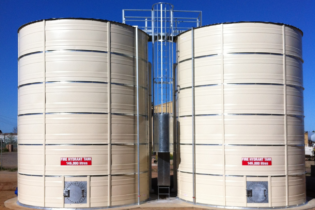The Picture of Transformation 2040 Report examines the drivers and blockers of transformation in South African society and provides a hypothesis of what 2040 could look like. Siemens South Africa interviewed hundreds of private and public sector experts and conducted extensive research, to determine South Africa’s potential future.
2024 is an interesting year to examine as it sits halfway between the 2030 SDG goals and the 2050 global net zero climate goals. Siemens reports that South Africa could see a boom in regenerative high-tech farming, 6G-powered smart cities, an industrial metaverse, automated robotic mining, electric trucks, trains, taxis, and cars, doubled rail and air freight volumes, smart digital water management, and artificial intelligence (AI) powered industries. “We looked at the technological progress we can make, the decarbonisation paths we can forge, and the circular, regenerative systems we can put in place to achieve beneficial transformation in South Africa,” says Sabine Dall’Omo, CEO of Siemens Sub-Saharan Africa. “We asked ourselves, how will we live in the future? What is the life we want to fashion for ourselves, our children, and our communities? And how can we – as companies and individuals – transform the every day to create a healthier, fairer, more sustainable world? Through our research, we have seen that society and the economy have the potential to change for the better by 2040 if we make the right sustainable investments now. We can make it happen. Now is the time to act, and Siemens is taking action,” she says.The report identified potential scenarios across eight areas of study – agriculture and food, digital, mining, energy, infrastructure, water, society, and mobility.
Here is a summary of the report’s key findings:
- South Africa’s agricultural sector will embrace the next generation of technology for greater financial security, environmental resilience, consumer health and safety, and nationwide food and water security. Remote sensors, drones, robotics, and smart siloes will prevail. Farmers will go off the grid with their own electric vehicle fleets and charging stations, their own 5G or 6G internet and their own renewable energy generation, while mobile food safety labs will test their produce. Regenerative practices will lessen their dependence on commercial fertilisers and pesticides and could reverse biodiversity loss and increase crop yield by 13%.
- By 2040 the digital economy will boom in countless ways. Greater internet access, and 5G and 6G adoption, could change how people work, learn, and enjoy their lives. Virtualised cities could change how citizens live. By 2040, South Africa’s smart cities are likely to rely on edge computing for real-time decision-making, while digital innovations will change how rural and urban populations are served by public and private service providers.
- Industries will be transformed by the rise of the industrial metaverse. More non-human labour will take up 50% of dangerous or tedious jobs. The mining industry will invest in more innovations for carbon sequestration, worker safety, environmental rehabilitation, and energy self-generation. AI and Machine Learning will drive decision-making and miners will embed smart, cost-saving Internet of Things (IoT) technologies into every layer of operations. Sensors, drones, 3D printing, and digital twin technology will drive efficiency.
- By 2035, AI could be automating 35% of all mining work. 50% of mining jobs because of its pivotal role in supporting a safer mining industry. AI can, for instance, predict scenarios and ensure that South African mining complies with global ESG (Environmental, Social and Governance) regulations to provide auditable proof of safe operational practices, more responsible water usage and more. Humans will do more meaningful, skilled, and creative work. South Africa will still have an energy backlog in 2040.
- Enough renewable energy generation will be in vain if the infrastructure does not exist to transmit and store this energy. Digital innovations will however exist that have the potential to address complex energy supply demand problems, while advances in renewable energy storage will be an economic game-changer. With sufficient energy infrastructure, South Africa could meet the energy demands of 95% of the population through on-grid and off-grid connections by 2040. The market could total 7.5 GW of installed capacity by 2035.
- The mobility sector will be boosted by substantial electrical energy generation and other alternative forms of energy such as battery power and hydrogen. In terms of infrastructure development, South Africa could see an exciting decade ahead, granted it attracts adequate investment. The country could see a boom in multimodal mobility solutions, digital infrastructure, connected megacities, better municipal infrastructure, and greater infrastructure innovation opportunities for entrepreneurs by 2040.
- Digital transparency will overhaul municipal services. As an antidote to the current prominent levels of municipal mismanagement, experts believe it is foreseeable that there will be much greater digital transparency when it comes to municipal trading services and infrastructure management by 2040.
- South Africa’s rail and air freight volumes could more than double by 2040. The Passenger Rail Association of SA (PRASA) is expected to roll out new electric modular units (EMUs) for inter-city commuting, and freight transport could shift away from its over-reliance on road travel to a more balanced use of rail and air freight, at more than double its current volume. The Gautrain is likely to be extended to more parts of Gauteng, with the addition of Gautrain inner-city buses that connect its stations to other urban hubs. AI and IoT could help manage traffic, public safety, energy, and water in most SA cities by 2040.
- In terms of mobility, South Africa will remain reliant on public transport, but the industry will ease its dependence on fossil fuels and embrace electric and hybrid modes of transport by 2040. An estimated 50% of vehicles in SA will be electric or hybrid by 2040, powered by about 300000 EV charging stations, while 35% of trains are likely to be electric as part of a revived rail system. SA’s taxi industry is likely to be formalised, digitised and overhauled by electric vehicles, while the e-hailing industry is expected to be fully electric by 2040.
- South Africa’s evolving logistics industry will digitalise exponentially – improving real-time tracking through smart sensors, goods management through robotics, and demand and supply volumes through tools powered by big-data, algorithms, artificial intelligence, and machine learning. Hope you enjoy learning about the future of South Africa as much as we did research it. South Africa will certainly be transformed by 2040 – and as the research points out, mostly for the better.
- The country is facing a water deficit of 17% by 2030. South Africa’s water situation is genuinely concerning. Today, 60% of the country’s rivers are over-exploited, 40% of its wastewater is untreated, and untold volumes are lost to leaks in ageing infrastructure and exploitation from agriculture and manufacturing. Technological interventions, innovation and multisectoral collaborations are key. By 2040, South Africa’s new National Digitized Water and Sanitation Monitoring System is expected to govern new water quality and quantity measurements, data collection, management, and communication protocols. Satellites, drones, robotic crawlers, sensors and other IoT technologies will monitor water and sewerage pipelines and reservoirs for problems such as leakages. Smart metres will improve municipal water readings, revenue collection and future demand calculations.
- With the rise in automation, the top human jobs will be highly skilled, creative, strategic, and technical. South African society could become a Top 30 economy by 2040 – if it improves its good governance, education backlogs and youth unemployment. With near-full nationwide internet access expected by 2040, digitalisation could transform the education, jobs, and skills landscapes, ensuring that the future of work (FOW) is more highly skilled and less manual and dangerous.
- Service delivery and political participation are also likely to be improved by greater internet access. Society could however be exposed to close to half a billion cybercrime attacks annually by 2040. In terms of labour distribution, broad-based black economic empowerment (BBBEE) is unlikely to be dismantled, and up to 50000 skilled South African professionals could be emigrating yearly from 2025.









